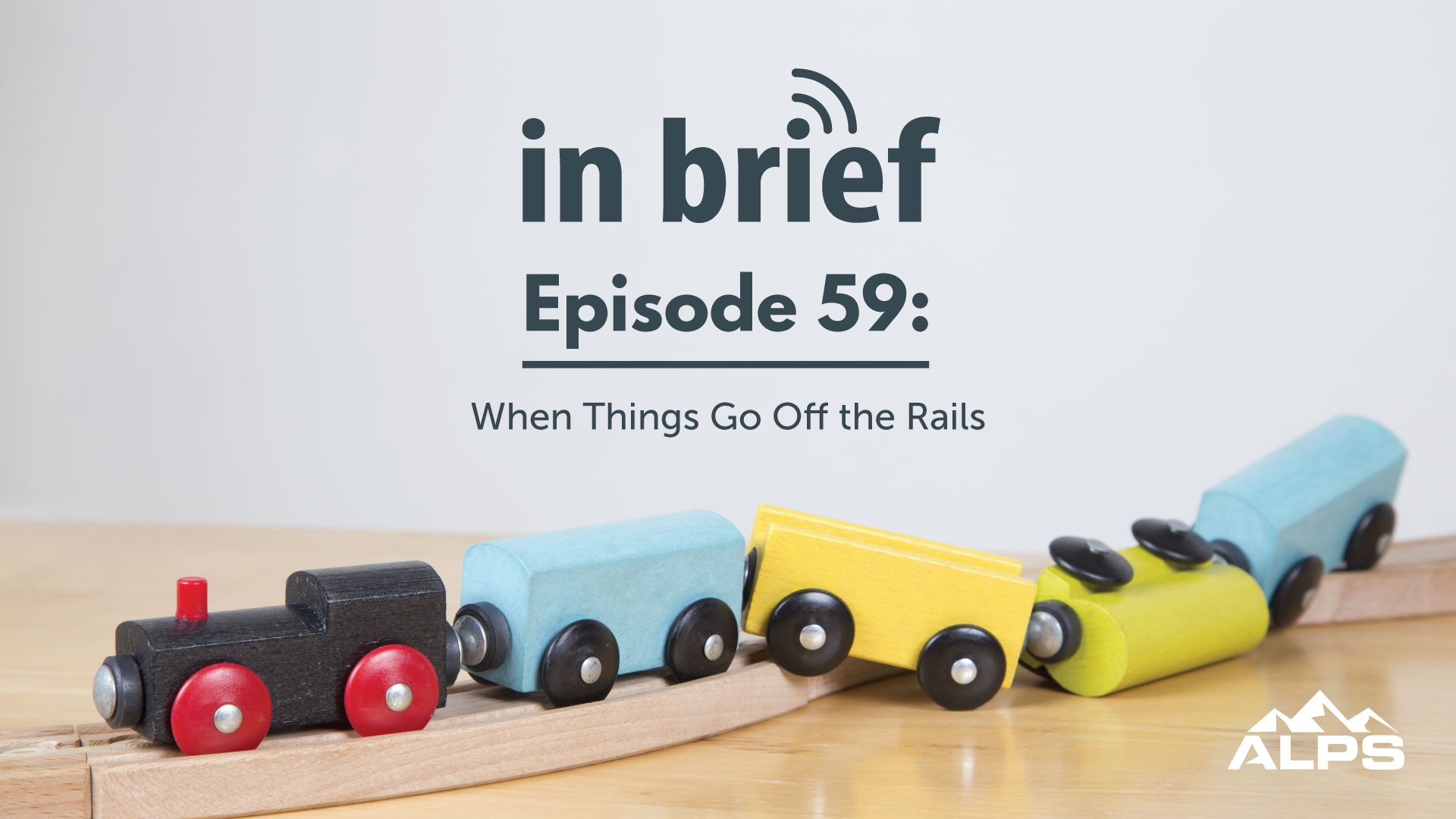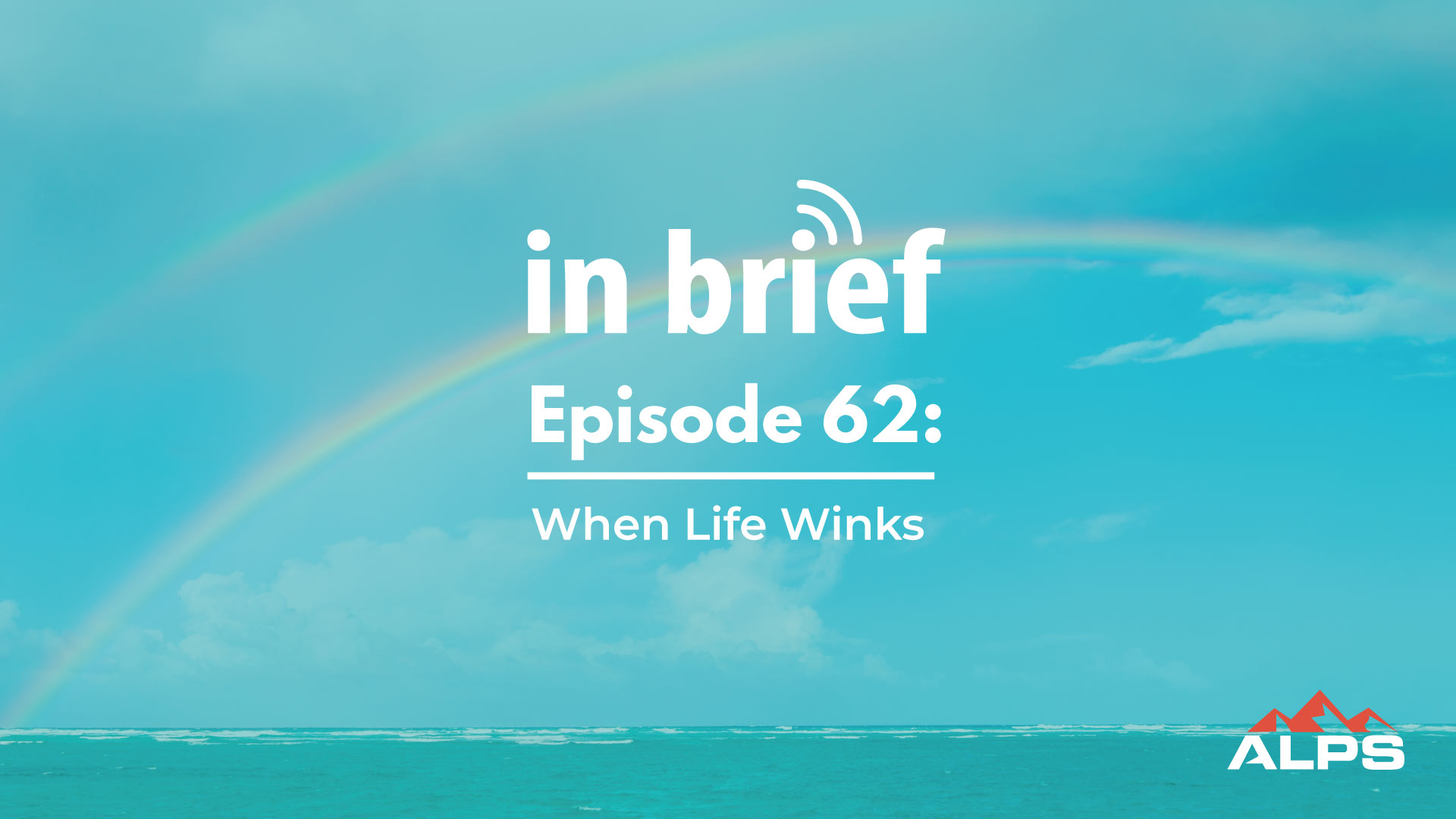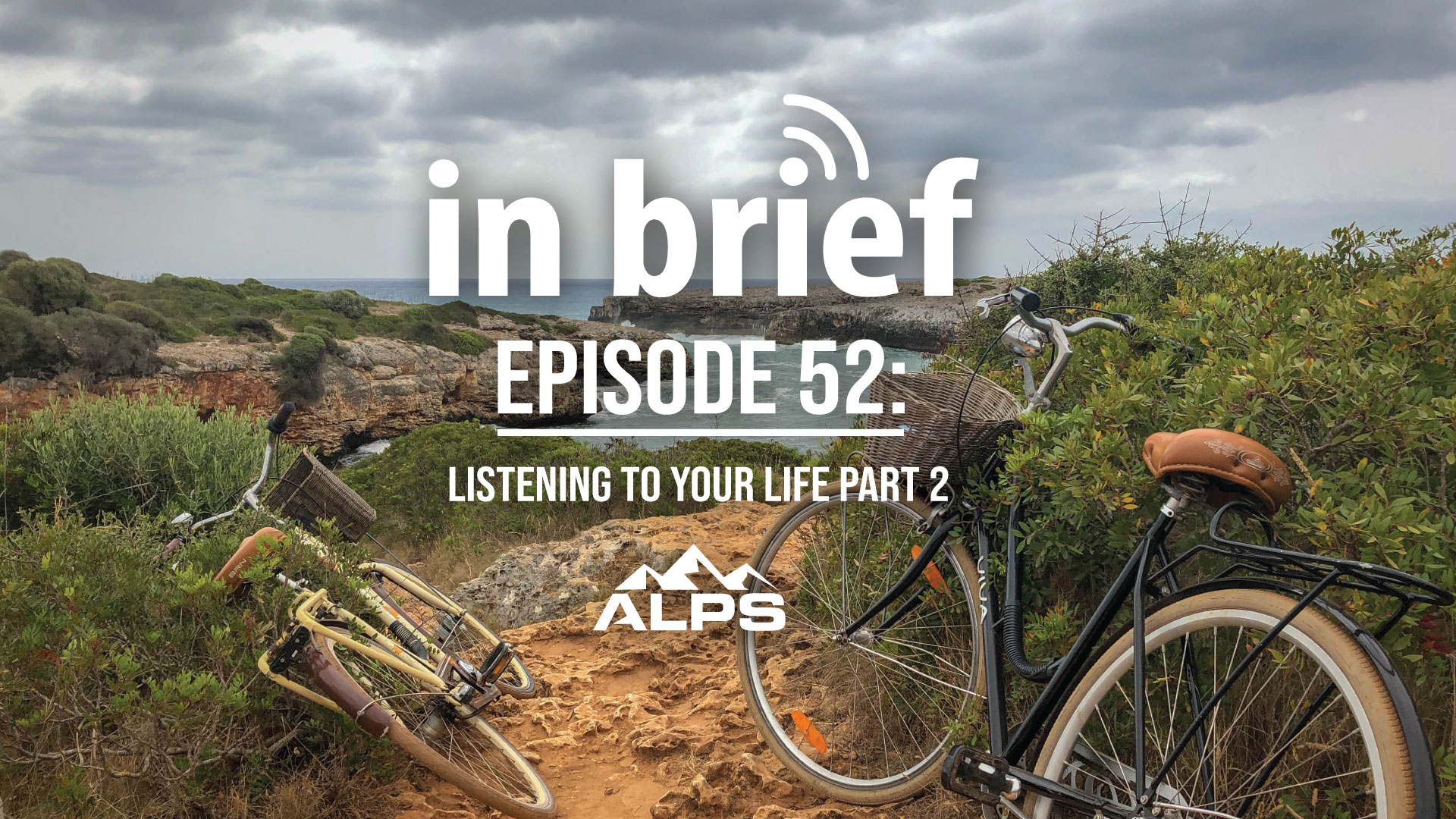11 min read
ALPS In Brief – Episode 60: The New Normal? Don’t Get Too Comfy…
As we transition to more permanent work-from-home schedules, the lack of supervision and a diminished sense of community could have bigger...
We've crafted solutions tailored to your firm
The world of insurance for law firms can be confusing, and difficult to navigate. We've created this glossary because these common insurance terms should be easy to understand.
12 min read
 Mark Bassingthwaighte, Risk Manager
:
Sep 9, 2021 12:00:00 AM
Mark Bassingthwaighte, Risk Manager
:
Sep 9, 2021 12:00:00 AM

Mark shares some stories of cancelled flights, employment emergencies, and more, to illustrate a timely point: When things go off the rails, being rude will get you nowhere. Instead of yelling and screaming in situations you can’t control, treat people with compassion, humanity, and respect, and see solutions present themselves.
Transcript:
Hello, I’m Mark Bassingthwaighte, the risk manager with ALPS. And welcome to the latest episode of ALPS In Brief, the podcast that comes to you from the historic Florence building in beautiful downtown Missoula, Montana. Today, I’m going to do another solo. And for those of you that listen to me, or have attended the CLE’s, and follow my writing over the years, you know that I, at times, I am a storyteller and I also am someone that just spends a lot of time in my head thinking. And I’ve been thinking a lot. What brought on the topic for today was among other things. My wife and I have recently become grandparents for the first time, and it’s very exciting. We’ve just recently returned from a visit to meet him and just had a wonderful, wonderful time.
And you get the thinking, at least I do, about what do I want him to know? Well, what, what life lessons will I be able to teach? Or what insights can I share? And I just got to thinking about some things and that has led to today’s topic. And really what I want to focus on is how to respond when things go off the rails. It’s kind of a general topic, I guess, of all of this. And a lot of the learnings and things that I’d like to share, insights, have just come from life experiences. And again, as I opened, I like to tell some stories. So I have a number of stories that I want to share.
The first involves a professional experience because law is not my first career, if you will. Many, many, many years ago, in fact back in the eighties. And I was working in a welfare office in Seattle, and it’s one of the largest ones at the time. Anyway, we gave out and I think more medical assistance in just about any place in the country. It was just a crazy busy place. At one point, I was involved training someone and literally the first day I started training with this other young fellow. I had a client come in and you go out to this sort of, this reception area is full of people, just chock full of large reception, private security, all over the place. And it was kind of a rough neighborhood and you would have this long row of interview rooms. So I go out to the microphone and call up the person that I was due to meet with. And we walk down a long row of interview rooms and sit down and started the discussion and the process of seeing how I might be able to help another young man get some assistance.
And as we progressed, this individual really got to be very confrontational and it got pretty crazy. And I’m just sitting here watching all of this. I don’t engage in situations like this. And I don’t know if that made him angry or not, but what happened immediately after I’m just kind of watching, he literally stands up, picks up this circular table that we were all sitting around, and the guy I was training also rose because he wasn’t sure what to do, perhaps a little frightened. And this client pinned the gentlemen I was training in the corner of a room, and he’s just threatening and screaming. And I’m just looking at him.
And my response was, “Look, this is a busy day for me. It’s clear you’re not wanting to work with me to get anything done. Tell you what, I got so much stuff to do. I’m going to go down the hall, go back to my desk and get to work on some other things. If, and when, you feel like you want to move forward here, you let him know out front and I’ll get back to it.” And I literally just got up and walked out.
Now, I could see the guy I was training was in a panic. Oh my God, what’s going on? And trust me, I was not on my way back to my office to work. I was on my way down the hall to get security and some assistance. Turns out I didn’t even need to go that far. You could hear a voice coming from the room, “Mr. B, Mr. B wait. Wait.” He put the chair or the table down. I came back and he just said, “I need some help.” And then we got to work and were able to take care of his needs.
That situation really stuck with me over the years for all kinds of reasons. But one of the things, it was an early lesson that has stuck with me ever since. And just underscores for me the value of not letting anyone else try to take control of my emotions and how I respond. I choose not to give someone that power. And that has really made a tremendous difference for me over the years. It was such a powerful experience. And I don’t know why I did it in terms of just…I just wasn’t going to, I don’t know. It’s hard to get my feathers ruffled perhaps at times, but I ended up… Don’t get me wrong, I certainly can get angry, but I would choose, for the most part, when I get angry, because it’s right for the circumstance. And I have every right to be angry but this wasn’t it. So it just an interesting experience.
I had another situation come up a number of years later. Where my family and I, kids, wife, even mom, were all traveling to Walt Disney world in Florida during a hurricane season. It was one of those years where there were back-to-back hurricanes. I think they, over the entire season, they had five actually hit landfall in Florida. And we managed to fit a vacation and a cruise in between two of these storms. But on the way down there’s a little bit of a delay because of, again, storms and the whole country in terms of the traffic grid, air traffic was just a mess. So we get in a day late and the luggage is nowhere near to be found. It may be a day or so, and it’s just a mess.
But it’s about midnight. Literally, we’re standing in line to report the missing luggage along with everybody else and try to figure out what’s up. And there was a gentleman in front of us. And he was married, had a teenage daughter. And they were to be… So it’s midnight and the next day they were to be at Cape Canaveral to board a cruise ship and head out. And none of their luggage is here. And this guy is screaming, bloody murder, and being very, very rude to everybody that worked at the airline and very demanding. His wife is upset. His daughter’s crying. And he said, “We have this, is a dream thing, we have all of our clothes. We need… This is a wedding on the ship.” And they were guests, she wasn’t the bride in terms of the daughter or anything, but this was a big deal and he’s very, very upset. And he’s not listening.
The woman’s explaining, “Sir, we have hurricanes. We’ve done everything we can. There’s nothing we can do. I assure you, we know where your luggage is. I cannot get it here before the cruise leaves, but it is in Tampa.” Orlando to Tampa is, I don’t know, depending on traffic, hour and a half tops. And I’m sitting here thinking to myself, why don’t you just close your mouth, stop yelling. See if you can get your wife and your daughter into some local hotel. Try to rent a car. I don’t know if this is possible, but it’s the only option. And then drive over to Tampa, pick up your luggage and get back. It’s just an option that wasn’t even remotely going to be on his radar. He, he just decided to be angry and rude.
And that situation really stuck with me over the years, too. And the learning, for me, and it just was so… I talk about it in some of my other podcasts, listening to your life. It was so loud in terms of the message and the message to me was rudeness and demands get you nowhere. And sometimes, you’re the only person that can solve the problem. Give it a shot.
Now I’ve been traveling for ALPS for 23 years now. And we love to vacation. Have traveled abroad a few times and all over the country for all kinds of vacations. So trust me when I say that time in Orlando with our lost luggage was not the first time I’ve had to deal with a canceled flight. Or changes… I mean, when COVID hit in the shutdowns, you know, boy, all kinds of plans got crazy.
I’ve had my fair share of having to deal with customer support people in both in-person and online. And I, again, I have seen time and time again, and particularly in person at airports, just as an example, of people in front of me, again, yelling and just screaming and trying to have things done. And it doesn’t get you anywhere. My response is, okay. So a flight’s been canceled and there are, depending on the size of the plate, anywhere from 50 to 250 people, they got to rebook and deal with. And I’m sitting here thinking, do you folks not get it? The people that you’re yelling at and demanding something from have nothing to do with the problem.
They didn’t… I had a situation where that the windshield of an airplane was broken on the way down. And we had to wait overnight for a new windshield to come in. They can’t fly the plane without a windshield, I mean that just isn’t going to happen. And I said, it’s not this person’s fault. I always approach these folks as this is my new best friend. Because I’ve learned over and over again, if you just treat them with some level of courtesy and polite. Sometimes, the first thing I’ll say, “Man, it looks like you are having a rough day. And I know this isn’t your fault. I am so sorry that all of us are having to go through this experience, but you know what these things happen.”
And I’ll tell you every single time I have treated people with just a little dignity, little respect, a little politeness, my problem was solved in almost every situation pretty quickly. I’ll be booked on an immediate flight. I’ve literally heard peoples say five or six times ahead of me as all these people are yelling, “The best we can do is Tuesday to get you out of here.” And on and on and on. And then I’ll walk up and just put a little smile and say, “I’m sorry, you’re having a rough day.” And I’m on a flight six hours later.
People will…if you treat people with respect, sometimes just solutions can appear. So I guess to me, that’s the learning of this one. I’ve learned that being courteous and polite leads to solutions for me, even where others have found none. I don’t know that it should be this way necessarily, but it is what it is. People are going to respond to anger and rudeness and disrespect differently than they’re going to respond to when someone has some compassion and takes the time to be polite and takes the time to wait. I’m sorry, this may take another 10 minutes. I’m doing… Ma’am please don’t worry. I got all the time in the world. You are helping me. It’s good. Relax. We’re fine. So something to think about.
I also can share that my wife and I now we’ve been married 20 years. Coming up on 21 here pretty soon, in fact. But we’re a Brady family. The number of years ago we went through this challenge of trying to put a step family together. And I’m proud to say we did that very successfully. To this day, our kids, in terms of even the step-kids, everybody views each other as family, in other words. And they’re all long since gone and independent and have families of their own, some of them, and everybody still is very, very close and we are a family.
I will tell you, that’s not easy and there are challenges. But one of the things that I learned out of this whole experience was the value of playing what I have come to call long ball in terms of building relationships, maintaining relationships. And to me, it’s sometimes this is, well, I guess I should say what I discovered, sometimes it’s worth losing in the short term. Whether there’s a debate, or an argument, or just a disagreement. It’s worth losing in the short term sometimes, or even just learning to give a little, to negotiate and find a solution here in order to eventually gain a lot more. It’s a concept, this idea, this notion of long ball, as I call it, has been truly in so many ways, a game changer for me in terms of how I try to live my life.
I’ve talked about this long ball, so learning from the experience, but I want to really describe what I mean by long ball and how that learning has come about. And really what it’s about is, is saying I’ve come to appreciate that you really, and I’m speaking personally, I really want to try every chance I get to not allow someone else to pull me in to dealing with some irrelevant or ultimately irrelevant kind of issue. There are big problems and little problems. I’m going to try to dismiss the little problems and lose now and again, or whatever, because I’ve got my eyes on a different game. I’m looking longterm. So it’s about not taking the bait and staying engaged in every single minor issue that someone wants to keep me engaged with.
Sometimes this could be an ex. Sometimes this is children. Sometimes of stepchildren. But it’s about saying I don’t want to be pulled off game. And the way I see it, and the more I’ve kind of tried to do this in my life, and I started this, to be honest with you, before the step family. It’s just that experience putting the step family together really kind of cemented a lot of this. But in my experience over the years, so many times people who are being confrontational really are playing a very short game. They want the win and they want it now. And they may keep doing it over and over hoping to keep engaged with this dysfunction or it may give them a sense of powers. I don’t know, everybody’s different. But I just choose not to play that game. I choose to focus long-term.
So what is the point? And, I want to sort of summarize some of the learnings here and take it up a notch in terms to a bigger picture. Why are these stories that I’ve just shared, the insights that I’ve just shared important to me? And it gets back to sort of problems, whether it’s confrontation. Whether it’s just things going off the rail in so many ways. I sit and I’ve come to say, whenever there is an issue, a problem, whatever that means to you, I stop and say, I kind of asked myself that question. I try to categorize it and say, is this something I can change? Is this something I can influence? Or is this something I have no control over at all? Can’t do anything about.
Once I make that determination, I will sit and say, okay, now my goal is to try to spend the most energy of what I have on things that I can change. I will try to spend some energy on things I can influence. And I try to spend no energy on something I can’t do a darn thing about. And it’s very difficult at times to do that, but I really believe there’s value in sort of running through that analysis. So these are some personal things that I’ve been sharing and some insights that I think are very valuable. I’d love our grandson to hear at some point, course when he’s old enough to appreciate what I’m even talking about. But these are things I’ve talked to my children about, and I have tried to teach and give them some tools because I have found to be very, very valuable.
But I can also hear you saying, okay, so what’s the point here, Mark? In terms of the context of a podcasts on risk management resource site here for a malpractice insurer. What’s a fair question? And it’s a fair question. And here’s what I would encourage you to think about. The context of these learnings that’s change from my personal experience, to the context of being civil in the practice of law. Confrontation is out there. There are some lawyers that really practice incivility in a very significant way and are very intentional about it. But when I look at saying, okay, when faced with rudeness with uncivil behaviors, in my mind, in my experience, the perfect foil to that is formal politeness. Which by the way, is the definition of civility. But I tend to state it in a slightly different way. Instead of using the word formal politeness, I try to be intentional with my politeness.
Now I’ll be the first to admit that I remain a work in progress with all of this. But the better I get at it, the more I practice it, the greater the benefits I see in experience. And it even starts to change little things around to me. Others become more polite. It just kind of spreads. It’s like when you yawn, take our little grandson, and you can yawn a little bit, then he’ll yawn. It’s contagious.
So I just encourage you to think about that. Because a lot of times when things go off the rail, others are trying to have some power over us to control the situation. Whether it’s in a courtroom, in a deposition, in a negotiation, clients could be playing this game, all kinds of things, all kinds of places this can come up. So I encourage you to give some thought about being intentional with civility.
And for one last reason why, as I like to say, again for you regular folks that know sort of my, the way I tend to talk and way I summarize things, is I see it to do it any other way is just wasting energy. Life is too short as it is. So there are just a couple of thoughts. In some ways, I’ve shared some things that I look forward to years from now, sitting down and having a conversation with our grandson and sharing some of this and hoping that that may be of use to him. But until that time, I hope this will be useful to you as well. So thanks for listening. Hey, it’s been a pleasure. Have a good one folks.
ALPS In Brief Podcast Intro/Outro Music: Walk In The Park by Audionautix is licensed under a Creative Commons Attribution 4.0 license. https://creativecommons.org/licenses/by/4.0/
Artist: http://audionautix.com/
Since 1998, Mark Bassingthwaighte, Esq. has been a Risk Manager with ALPS, an attorney’s professional liability insurance carrier. In his tenure with the company, Mr. Bassingthwaighte has conducted over 1200 law firm risk management assessment visits, presented over 600 continuing legal education seminars throughout the United States, and written extensively on risk management, ethics, and technology. Mr. Bassingthwaighte is a member of the State Bar of Montana as well as the American Bar Association where he currently sits on the ABA Center for Professional Responsibility’s Conference Planning Committee. He received his J.D. from Drake University Law School.

11 min read
As we transition to more permanent work-from-home schedules, the lack of supervision and a diminished sense of community could have bigger...

14 min read
Hello, I’m Mark Bassingthwaighte, the risk manager with Alps and welcome to another episode of ALPS In Brief, the podcast that comes to you from...

16 min read
As Mark alluded to in Part 1 of Listening to Your Life, the journey isn’t over. Mark recaps the lessons learned over a season of cycling, exceeding...